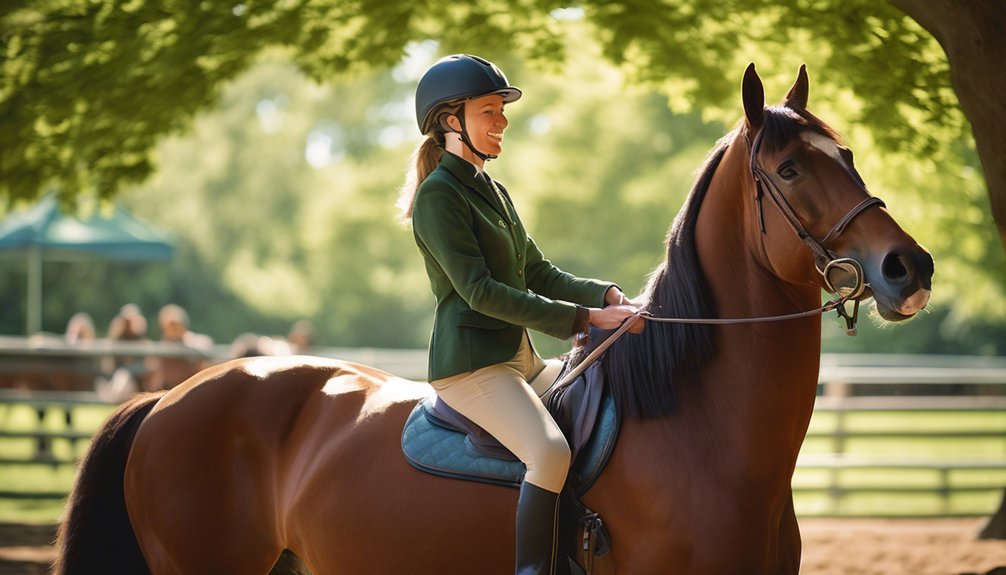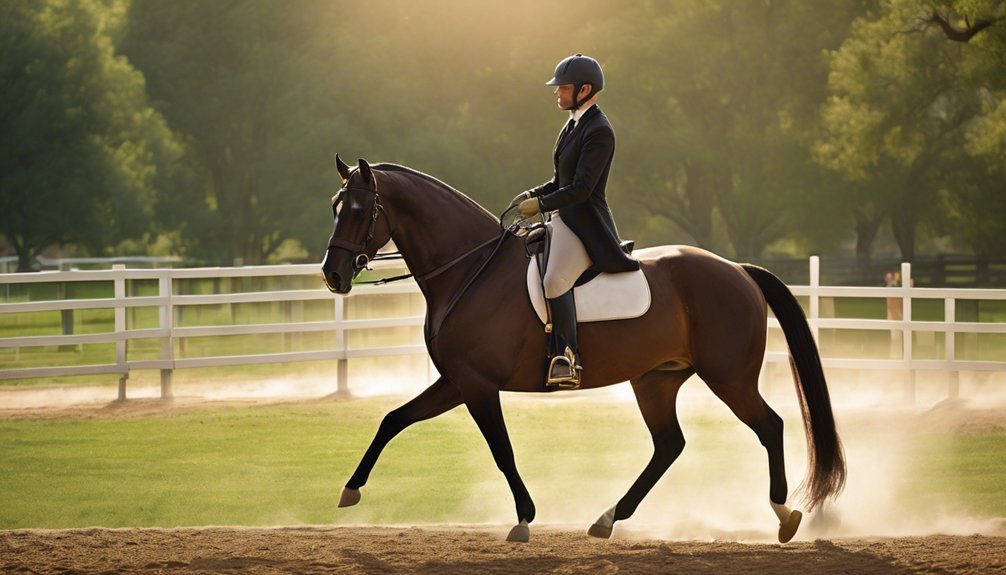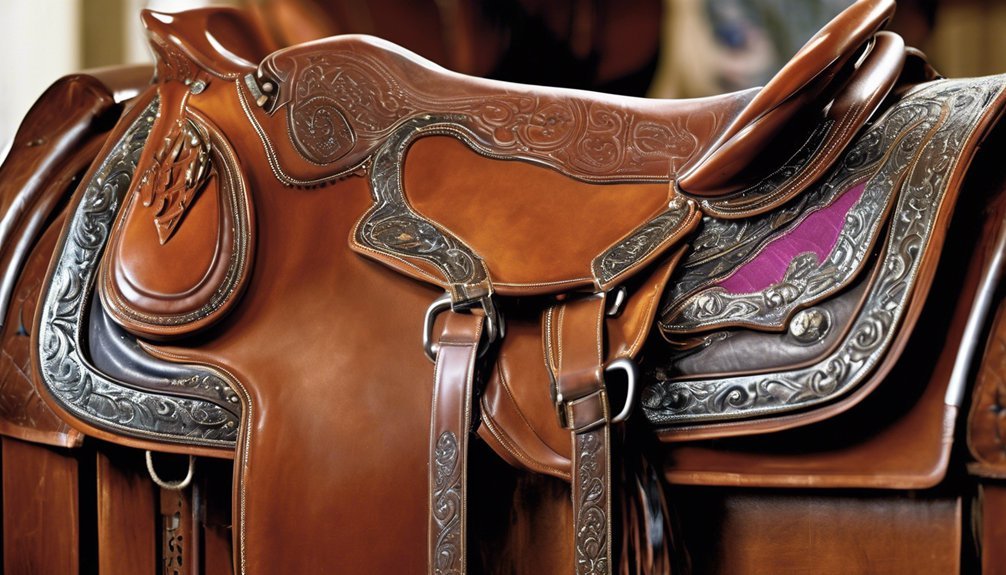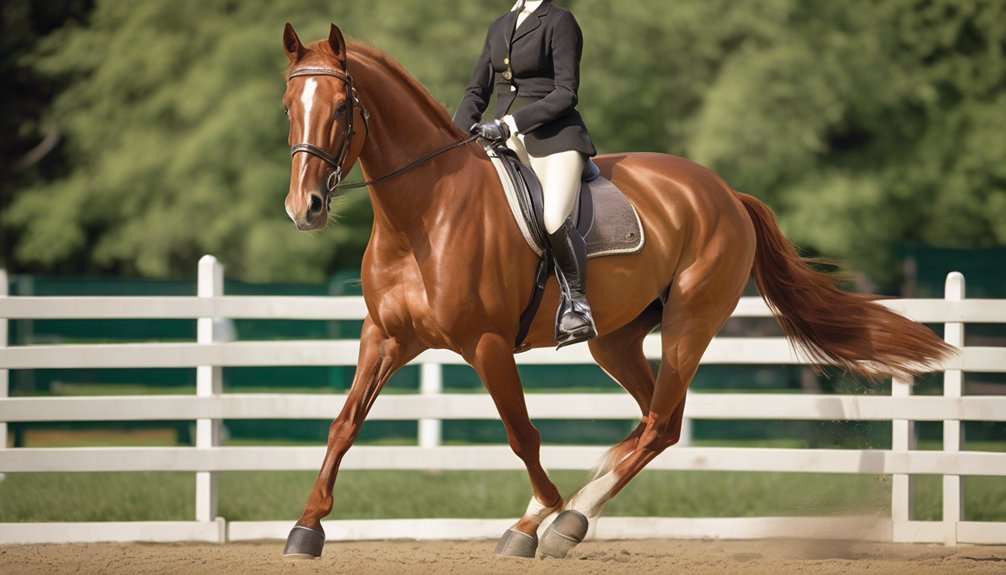
It can feel like your horse is about to explode with nerves at a show, can't it? But with the right approach, you can transform that anxiety into calm confidence. Establishing a consistent routine and using effective groundwork techniques can make all the difference. Plus, desensitizing your horse to the show environment is crucial. So, how can you create a serene atmosphere for both you and your horse? Let's explore some practical strategies.
Key Takeaways
- Establish a consistent pre-show routine to create predictability and reduce anxiety for your horse.
- Use groundwork techniques like leading and lunging to build trust and enhance responsiveness.
- Gradually desensitize your horse to show environments by simulating stimuli at home.
- Incorporate relaxation techniques, such as breathing exercises, to promote a calm atmosphere.
- Observe and respond to your horse's behavioral cues to adjust your approach as needed.
Understanding Your Horse's Behavior

When you're preparing for a show, understanding your horse's behavior is crucial, as it can greatly influence their performance and your overall experience.
Pay attention to horse communication, as your horse can express feelings through various behavioral cues. For instance, if you notice your horse pinning its ears back or swishing its tail, it might be feeling anxious or irritated.
Conversely, soft eyes and relaxed posture typically indicate comfort. By observing these signals, you can better gauge your horse's mood and adjust your approach accordingly.
Building this connection fosters trust and helps create a calmer environment for both of you.
Establishing a Routine
Understanding your horse's behavior lays the groundwork for establishing a routine that helps keep them calm during a show. By integrating pre-show rituals into your practice, you create a sense of predictability that your horse craves.
Start with simple tasks, like grooming or warming up in a familiar way, to signal that it's showtime. The routine benefits both you and your horse, fostering a reassuring atmosphere that reduces anxiety.
Observing your horse's reactions during these moments can help you tweak the routine for maximum comfort. Remember, consistency is key; the more they know what to expect, the more relaxed they'll be.
Together, you can embrace the show with confidence, knowing you've set the stage for success.
Using Groundwork Techniques
While you prepare for a show, incorporating groundwork techniques can significantly enhance your horse's calmness and focus. Using groundwork exercises helps establish clear horse communication and builds trust between you and your horse. Here's a simple overview of effective groundwork exercises:
| Exercise | Purpose | Benefits |
|---|---|---|
| Leading | Establishes respect | Builds confidence |
| Yielding to Pressure | Teaches responsiveness | Enhances trust |
| Ground Tying | Promotes patience | Improves focus |
| Lunging | Encourages relaxation | Releases excess energy |
| Desensitizing Objects | Familiarizes with surroundings | Reduces anxiety during shows |
Desensitization to Show Environments

To ensure your horse remains calm during a show, it's essential to desensitize them to the unique stimuli of the competition environment.
Start by incorporating desensitization exercises into your routine, gradually introducing your horse to elements like loud noises, bustling crowds, and bright colors.
Create show environment simulations at home, using props like banners and speakers to mimic the real thing. This helps your horse become familiar with the sights and sounds they'll encounter.
Observe your horse's reactions closely, adjusting the exercises as needed to build their confidence.
By doing this, you foster a sense of security in your horse, making them feel more at ease during actual events.
Practicing Relaxation Techniques
In order to keep your horse calm during a show, practicing relaxation techniques can make a significant difference.
Start by incorporating breathing exercises into your routine. Take deep, slow breaths, and focus on the rhythm; this will help you create a serene environment for both you and your horse.
As you breathe, visualize a peaceful setting where you feel at ease—this is where visualization techniques come into play. Picture yourself and your horse confidently navigating the showground, free from distractions.
The Importance of a Calm Handler
Practicing relaxation techniques not only benefits your horse but also highlights the importance of a calm handler. Your calm energy directly influences your horse's demeanor, fostering a sense of security.
Here are four ways to embody that calmness:
- Breathe Deeply: Take slow, deep breaths to center yourself before entering the arena.
- Maintain a Steady Posture: Stand tall and confident, as your body language speaks volumes.
- Use Positive Affirmations: Remind yourself of your skills and bond with your horse; this boosts handler confidence.
- Stay Present: Focus on the moment, minimizing distractions that may add tension.
A calm handler creates a peaceful atmosphere, allowing both you and your horse to shine during the show.
Utilizing Calming Aids

While a calm handler sets the stage for success, utilizing calming aids can further ease your horse's nerves during a show.
Consider herbal supplements designed to promote relaxation without sedating your horse. These can be a great addition to your routine, helping your horse feel more at ease in a bustling environment.
Additionally, calming wraps can provide a sense of security and comfort. By applying these wraps before the show, you create a soothing environment for your horse, which can help reduce anxiety.
Always consult with your veterinarian before introducing new products, ensuring they're safe and suitable.
Post-Show Care and Recovery
After a show, taking the time to focus on your horse's post-show care is crucial for their recovery and well-being.
You've worked hard, and so has your horse. Here are some effective strategies to ensure they bounce back:
- Cool Down: Gradually walk your horse for 10-15 minutes to help their heart rate return to normal.
- Hydration Strategies: Offer fresh water and consider electrolyte solutions to replenish lost fluids.
- Rest and Relaxation: Give your horse some quiet time in a familiar environment, allowing them to unwind.
- Check for Signs of Discomfort: Observe your horse for any signs of stress or fatigue, and address them promptly.
These practices not only support recovery but also strengthen the bond between you and your horse.
Frequently Asked Questions
What Should I Do if My Horse Refuses to Enter the Show Ring?
If your horse refuses to enter the show ring, observe its behavior. Use show ring strategies like gradual exposure and positive reinforcement. Stay calm, reassure your horse, and build trust to help ease its anxiety.
How Can I Identify Signs of Stress in My Horse During the Show?
Ever noticed your horse acting differently? Pay attention to subtle body language and behavioral cues. Signs like pinned ears, tossing heads, or pacing can reveal their stress. Understanding these signals helps you support your horse better.
Are There Specific Breeds That Are More Prone to Show Anxiety?
Yes, some breeds, like Thoroughbreds and Arabians, can show heightened sensitivity to anxiety triggers. Understanding their breed characteristics helps you prepare better, creating a supportive environment for your horse and fostering a sense of belonging in the show community.
How Can I Address My Horse's Fear of Loud Noises at Shows?
To help your horse conquer fear of loud noises, try noise desensitization techniques. Gradually introduce sound exposure exercises, starting with soft sounds and slowly increasing volume. Patience and consistency will foster trust and confidence in your bond.
What Are the Best Calming Supplements for Horses Before a Show?
When choosing calming supplements for your horse, consider herbal supplements like chamomile or valerian. Also, magnesium sources can help reduce anxiety. Always consult your vet to find the best option for your horse's needs.
Conclusion
By nurturing your horse's confidence and incorporating these calming strategies, you're creating a bond that transcends the show ring. Think of it like a dancer preparing for a performance; with each practice, they grow more at ease under the spotlight. Remember, your calmness resonates through the reins, guiding your horse as they navigate the excitement of competition. Together, you can turn anxiety into assurance, transforming the show into a shared celebration of your hard work and trust.





